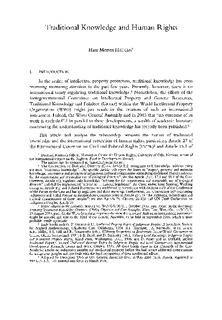| dc.description.abstract | In the realm of intellectual property protection, traditional knowledge has been receiving increasing attention in the past few years. Presently, however, there is no international treaty regulating traditional knowledge.’ Nonetheless, the efforts of the Intergovernmental Committee on Intellectual Property and Genetic Resources, Traditional Knowledge and Folklore (GRTKFw) ithin the World Intellectual Property Organization (WIPO) might just result in the creation of such an international instrument. Indeed, the WIPO General Assembly said in 2003 that “no outcome of its work is excluded”.* In parallel to these developments, a wealth of academic literature Concerning the understanding of traditional knowledge has recently been published.3 This article will analyse the relationship between the notion of traditional knowledge and the international protection of human rights, particularly Article 27 of the International Covenant on Civil and Political Rights (ICCPR)4 and Article 15.1 ofthe International Covenant on Economic, Social and Cultural Rights (ICESCR).5 More specifically, the article will seek to answer to what extent recognized human rights contribute to the emerging acknowledgement of traditional knowledge at both the national and international level. In other words, is there an obligation under human rights law to provide for some kind of protection of traditional knowledge? The pertinence of such a question is based on the acknowledgement of the relevance of human rights in the context of traditional knowledge as expressed by the WIPOas~ w ell as by certain States.’ It is assumed for the purpose of this article that most indigenous peoples and local communities are receptive to a form of protection of their traditional knowledge.* Moreover, it is also important to acknowledge that while the notion of exclusive rights is considered to be alien to the culture of most indigenous people^,^ exclusive rights might be important in any indigenous community. Nevertheless, at the same time, caution should be applied when addressing intellectual property protection in the context of indigenous peoples and local communities. | |
